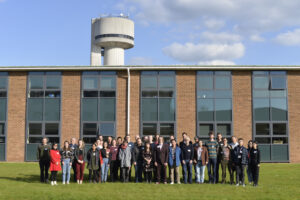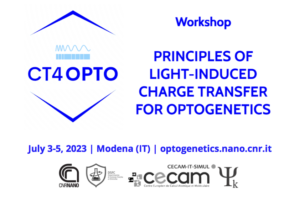The programme of Psi-k funded workshops for 2025 is now available!
Download a copy of the Psi-k workshops poster here to print and share.
The programme of Psi-k funded workshops for 2025 is now available!
Download a copy of the Psi-k workshops poster here to print and share.
The Recent Advances in Computer-aided X-ray Spectroscopy (RACXS 2024) workshop took place on 17-20 June at Aalto University, Finland. The event took place at the Department of Chemistry and Materials Science and was locally organized by Miguel Caro, Tigany Zarrouk and Patrick Rinke, and was financially supported by Psi-K, the Finnish CECAM node, the Aalto University Science Institute and the Aalto University Department of Chemistry and Materials Science.
The workshop gathered circa 60 participants from various countries (especially from Europe) to discuss about the current state of art and trends in computational approaches to predicting and interpreting X-ray spectroscopy of molecules and materials. The workshop was not limited to computational experts but also featured a good representation of experimentalists eager to use and curious about how to use novel computer-based methodologies to undertand the link between X-ray spectra and the atomic-scale structure of molecules and materials.
As expected, machine learning featured prominently in this workshop, but we also discussed developments in electronic structure methods for core-level prediction. In addition to these, the most prominent themes of the workshop were on deconvolution of X-ray spectra and incorporation of experimental observables into computational workflows.
Further information about the workshop can be found in the official website. Continue reading Recent Advances in Computer-aided X-ray Spectroscopy
From 10th to 14th June 2024 the second conference devoted to first-principles calculations of defect qubits’ magneto-optical and spin properties for quantum technologies was held at the Eötvös Loránd University (ELTE) in Budapest, Hungary where theory also met experiments to discuss scientific issues.
This conference welcomed 154 participants from 28 countries registered for the workshop from 5 continents including the organizers. The participants showed up in person at the workshop site and attended the scientific talks except for one attendee with on-line participation. The final scientific program of the workshop lasted for five full days, included 18 invited talks, 41 contributing talks, and a poster session with 87 posters, and a Discussion session about single defect engineering with leading experimentalists and theorist. The event was sponsored jointly by the Psi-k organization, CECAM HQ, Eötvös Loránd University (Budapest, Hungary), Quantum Information National Laboratory of Hungary, and the Applied Physics Letters. Continue reading Defects in solids for quantum technologies – 2024
We are pleased to announce that the interdisciplinary workshop Theory around XFEL will take place from November 18th to 20th in Marseille.
It will gather theoreticians and experimentalists with physics, chemistry and biology backgrounds to discuss the state-of-the-art,
future prospects and opportunities of theoretical simulations related to X-ray free electron lasers. Various topics related to XFEL will be covered:
The list of invited speakers, as well as all practical information can be found on our website: https://xrayfel.github.io/
Registration is free but mandatory. It includes lunches and coffee breaks during the workshop.
Please fill out this form: https://xrayfel.github.io/register.html.
The number of participants is limited so please register as soon as possible.
Note that you can send an abstract if you want to be considered for an oral contribution. You will find a template on the registration form, please use this template to submit your abstract in PDF format.
Two types of contributions will be possible: regular talks of 30 minutes (questions included), and flash talks of 5 minutes. Please select which type of contribution you want when filling the registration form.
We also announce that the plenary meeting of the GDR XFEL will take place at the same location from 21th to 22th of November.
More information will soon be available here: https://www.gdr-xfel.cnrs.fr/actualite/plenary-meeting-2024/
Don’t hesitate to contact us at [email protected] if you have any questions.
We hope to see you in Marseille next November!
The LOBSTER School on Chemical Bonding Analysis took place at Aalto University, Finland on 12-14 March 2024 and gathered over 30 participants. The purpose of the School was to introduce the theory and practicalities, as well as recent developments on both, behind the LOBSTER code. LOBSTER is a popular code that allows the user to perform “electronic structure reconstruction” in terms of localized projections of plane-wave-based wavefunctions, allowing a quantitative interpretation of the nature of chemical bonding in solids.
Continue reading LOBSTER School on Chemical Bonding Analysis
Join us for a deep dive into the cutting edge of quantum materials research and quantum chemistry at the upcoming webinar on “Quantum Monte Carlo HPC Applications in Condensed Matter, Quantum Chemistry, and Materials Science” on January 25, 2024, from 09:30 to 12:30 CET. The webinar is a collaborative effort between the Targeting Real Chemical Accuracy at the EXascale (TREX) project and CECAM (Centre Européen de Calcul Atomique et Moléculaire).
The webinar will be exploring the frontiers of quantum materials research and quantum chemistry, by means of Quantum Monte Carlo (QMC) calculations, owing to their unique suitability in solving complex many-body problems as well as in harnessing the parallelism offered by upcoming exascale supercomputer architectures.
The agenda covers a spectrum of key topics, including magnetism, surface physics, layered materials, energy excitations, and high-pressure hydrogen. Participants will gain a deeper insight into high-performance computing applications via quantum Monte Carlo simulations.
This webinar caters for researchers, students and professionals in the fields of quantum chemistry, condensed matter physics, and materials science.
dear colleagues and friends,
it is with pleasure that we announce the forthcoming
Theoretical Spectroscopy Lectures
that are going to take place in CECAM, Lausanne
March 11, 2024 – March 15, 2024.
The deadline for registering is 5 February 2024.
The event is going to take place at the CECAM HQ in Lausanne. Please take note that in order to participate to the hands-on sessions, you are required to come with a laptop (better if running under Linux).
Please find here the details of the school
https://www.cecam.org/workshop-details/1195
We thank Psi-k and the gdr REST for extra funding.
Looking forward to seeing you in Lausanne.
The organisers,
Francesco Sottile
Gian-Marco Rignanese
Valerio Olevano
First-principles Green function formalisms: algorithms, method developments and applications to spinorbitronics and magneto-superconductivity
4-7 of September 2023, Athens, Greece
The WE-Heraeus workshop entitled “First-principles Green function formalisms: algorithms, method developments and applications to spinorbitronics and magneto-superconductivity” took place from 4-7 of September in Athens, Greece. After years of only online meetings, the generous funding by the Psi-k charity and the WE-Heraeus Foundation made it possible to bring together the ab-initio Green function community in person. This workshop fostered networking opportunities and important personal exchange among different groups of method developers in the ab-initio Green function community. This was further stimulated by the complementary coffee breaks and lunches that were served in the rooms of the Kostis Palamas building of the National and Kapodistrian University of Athens where the entire workshop took place. Continue reading WE-Heraeus workshop on First-principles Green function formalisms
The workshop “Open Science with the Atomic Simulation Environment” was held at Daresbury Laboratory, UK, from April 24-28 2023. (Conference website)
The event consisted of scientific talks and posters, followed by parallel tutorial and “hackathon” sessions. Chemistry and physics research were presented that develop and apply atomistic methods with an emphasis on automation, interoperability and reusability.

This event was primarily funded by CECAM (through the Flagship Workshop programme) and Psi-k, with additional funding from CCP5, CCP9, ALC and PSDI
Continue reading Psi-K/CECAM Flagship workshop: Open Science with the Atomic Simulation Environment
 The Workshop “Principles of Light-Induced Charge Transfer for Optogenetics” was held in Modena (Italy) from July 3 to July 5, 2023 at Complesso San Geminiano (via San Geminiano 3), in the historical city center of Modena.
The Workshop “Principles of Light-Induced Charge Transfer for Optogenetics” was held in Modena (Italy) from July 3 to July 5, 2023 at Complesso San Geminiano (via San Geminiano 3), in the historical city center of Modena.
The event was organized by:
the Nanoscience Institute of the National Research Council of Italy – CNR Nano, the University of L’Aquila – Dipartimento di Scienze Fisiche e Chimiche (DSFC), the University of Southern California, and the Karlsruher Institut fur Technologie.
The event was sponsored by:
Psi-k, the Nanoscience Institute of the National Research Council of Italy, the University of L’Aquila – Dipartimento di Scienze Fisiche e Chimiche (DSFC) and Cecam-IT-Simul.
The aim of the workshop was to gather leading experts in the experimental and theoretical investigation of photoactive proteins that find application in the field of optogenetics. After the successful virtual edition of the same workshop in 2021, we organized a new, fully in presence, edition of the “Principles of light-induced charge transfer for optogenetics” workshop to emphasize new results and point out new directions, challenges and opportunities in the following fields:
These and other issues were faced from a chemical physical perspective, highlighting the main recent achievements in this timely and stimulating research field. Continue reading PRINCIPLES OF LIGHT-INDUCED CHARGE TRANSFER FOR OPTOGENETICS